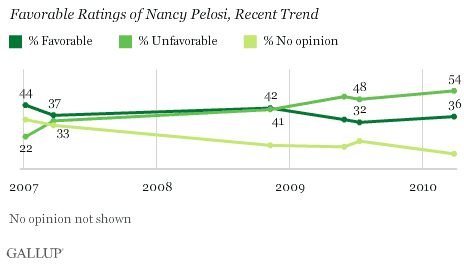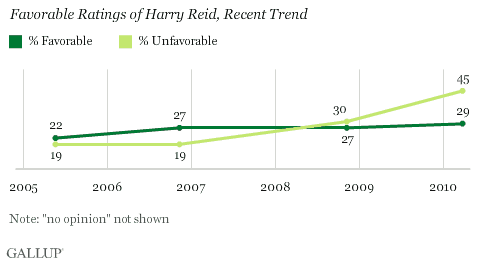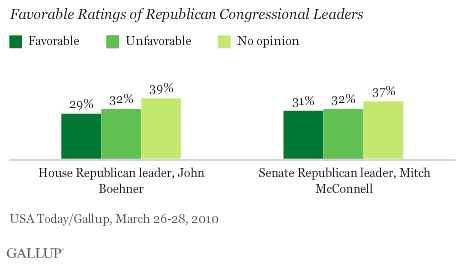PRINCETON, NJ -- Americans' views of House Speaker Nancy Pelosi are not fundamentally changed after the passage of healthcare reform. Though more Americans now have an opinion of her, both her favorable and her unfavorable ratings are up from the last reading, to 36% and 54%, respectively.

The currently net-negative view of Pelosi from the March 26-28 USA Today/Gallup poll stands in stark contrast to opinions of her as she became speaker of the House in January 2007. At that time, twice as many Americans viewed her favorably (44%) as unfavorably (22%).
Opinions of Pelosi grew more negative over the course of her first two years as speaker, such that about as many Americans viewed her favorably as unfavorably. During the last year, Americans' views have become much more negative than positive.
Americans' views of the Democratic leader in the Senate, Harry Reid, are similar to those for Pelosi -- 29% favorable and 45% unfavorable. It is unclear whether the healthcare reform process hurt Reid's image. The last time Gallup measured opinions of him, in November 2008, Americans were divided in their views, as they were for Pelosi at that time.
However, it is clear that as Reid has become better known, his negative ratings have increased while his positive ratings have been relatively flat.

Americans are less negative toward -- but also less familiar with -- the Republican congressional leaders. Opinions of House Minority Leader John Boehner and Senate Minority Leader Mitch McConnell are about equally positive and negative. More than one-third of Americans do not have an opinion of Boehner (39%) or McConnell (37%), compared with 26% for Reid and 10% for Pelosi.

As is the case for Pelosi, Boehner is better known now than he was before the healthcare reform process heated up, but the balance of opinion on him is unchanged. In July 2009, 25% of Americans viewed the House Republican leader favorably, 23% viewed him unfavorably, and 52% had no opinion.
The current poll marks the first time Gallup has measured opinions of McConnell.
Survey Methods
Results are based on telephone interviews with a random sample of 1,033 national adults, aged 18 and older, conducted March 26-28, 2010. For results based on the total sample of national adults, one can say with 95% confidence that the maximum margin of sampling error is ±4 percentage points.
Interviews are conducted with respondents on land-line telephones (for respondents with a land-line telephone) and cellular phones (for respondents who are cell-phone only).
In addition to sampling error, question wording and practical difficulties in conducting surveys can introduce error or bias into the findings of public opinion polls.
